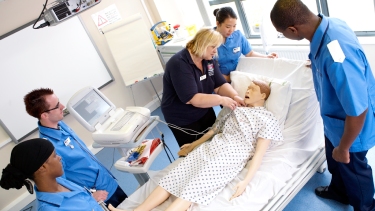Health, Nursing and Midwifery Overview
Embark on a profoundly impactful journey in healthcare at Hertfordshire International College (HIC), where our pathway leads to a degree which goes beyond the ordinary. Shaping the future professionals of diagnostic radiography, mental health nursing, midwifery, paramedic science, physiotherapy and oncology.
Our programme seamlessly blends into the degrees on offer from the University of Hertfordshire, where academic rigor blends with hands-on experiences, uniquely preparing you for dynamic and fulfilling careers in the healthcare sector. The foundation modules we provide give you all the skills needed to thrive in your chosen degree and onward career.
Explore the intricacies of diagnostic radiography and imaging, dive into the critical field of paramedic science, or master the art of physiotherapy for optimal patient care. Strong industry partnerships ensure that you not only gain theoretical knowledge but also immerse yourself in real-world settings, acquiring practical experience that extends beyond the classroom. Join us to pursue your passion for healthcare, where dedication meets compassion, and success unfolds on the front lines of patient wellbeing.

